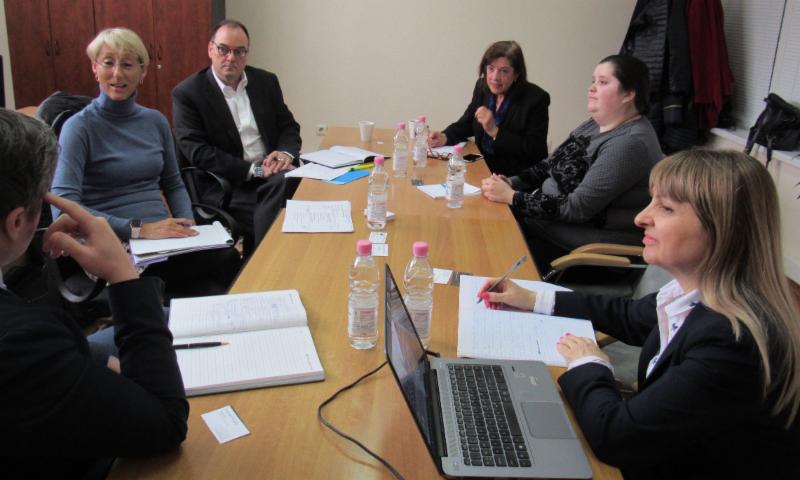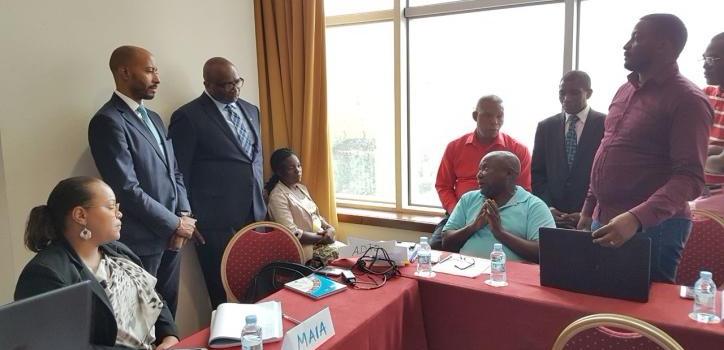Somalia: Conducting On-Site AML/CFT Examinations of Money Transfer Businesses
FSVC is helping to build the capacity of the Central Bank of Somalia to conduct AML/CFT exams; Mogadishu, March 2018.
Significant progress has been made in strengthening the capacity of the Central Bank of Somalia (CBS) to supervise the anti-money laundering/combating the financing of terrorism (AML/CFT) compliance of money transfer businesses (MTBs).
In February and March, FSVC’s long-term mentors in Mogadishu began participating in the on-site examinations of MTBs. This has enabled them to observe first-hand how CBS examiners implement in practice the knowledge and tools gained from FSVC. FSVC’s mentors are also able to give constructive advice on how to encourage MTB compliance with international AML/CFT best practices.
FSVC’s participation has already contributed to a stronger on-site AML/CFT examination process in Somalia. These on-site examinations are an important achievement for the CBS and a testament to the international community of the progress being made by Somalia in adopting reforms.
FSVC’s program in Somalia is funded by the Bureau of Counterterrorism at the U.S. Department of State.
Moldova: Creating a Communications Strategy for the Launch of a Central Securities Depository

FSVC volunteer experts working with NBM staff to develop a communications strategy; Chisinau, March 22, 2018.
FSVC has been helping the National Bank of Moldova (NBM) to establish a single Central Securities Depository (CSD) for government, central bank and corporate securities in Moldova. The creation of a single CSD will help ensure that securities are safely housed in one location, where transactions can be easily cleared and settled electronically.
This is an important step in helping to restore public confidence in the financial sector after Moldova’s 2014 banking crisis. The NBM therefore requested FSVC’s assistance in communicating the measures it is taking to safeguard the country’s economy, in particular the new CSD. In March, FSVC volunteer experts helped develop a communications plan and strategy for the launch of the new CSD, including designing a press release, reaching out to the appropriate media channels, organizing a press conference and preparing NBM staff to respond to difficult questions from the press and the public. As a result, the NBM is prepared to communicate openly and effectively with the public once the CSD launches.
This program is made possible by a grant from the U.S. Agency for International Development (USAID), administered by the Volunteers for Economic Growth Alliance (VEGA).
Angola: Promoting Civil Society Participation in Budget Reforms

GOSCOP representatives taking part in FSVC training; Luanda, March 2, 2018.
Since 2014, FSVC has worked to improve public financial management in Angola. More efficient public financial management will help protect Angola, an oil-dependent country, from volatile price swings in international gas prices by enabling the government to project more accurately revenues and expenditures.
An important aspect of sound public financial management is the representation of civil society’s interests in budget allocations and the ability of civil society to monitor government expenditures. This approach helps ensure that public revenues are reinvested back into communities, and also promotes greater transparency and accountability.
As part of its program in Angola, FSVC helped establish a local budget advocacy coalition of civil society organizations (CSOs), called the Group of CSOs for Budget Participation (GOSCOP). FSVC is working with GOSCOP to build the capacity of CSOs to advocate for budget priorities and monitor government spending.
In March, FSVC volunteer experts trained GOSCOP on how to analyze government budget audits and contribute to the transparent reporting of government audit reports. This training will help CSOs draft and publish analytical position papers based on audit reports, and encourage stronger policy dialogue with the Angolan government. As a result, CSOs are better equipped to identify and address fiscal shortcomings, and advocate more effectively for budget priorities.
This work is funded by a grant from USAID.